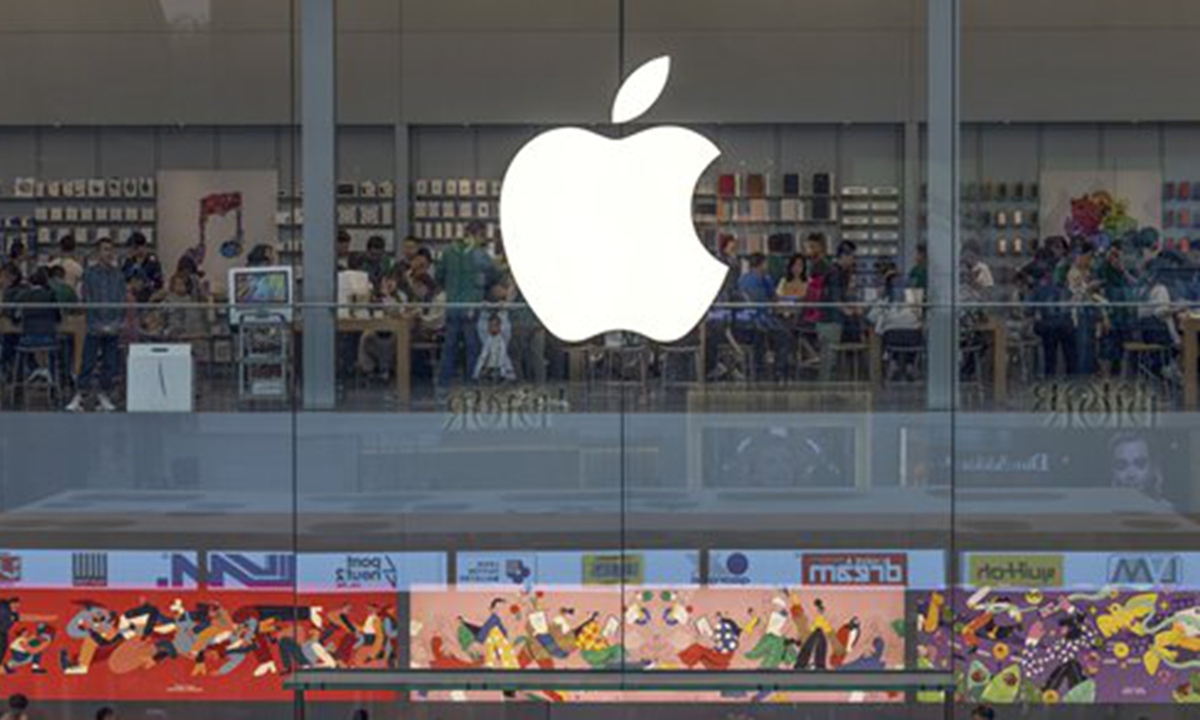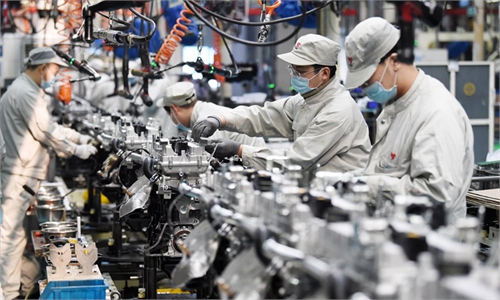
An Apple store in Chengdu, Southwest China's Sichuan Province. Photo: IC
Apple is set to unveil its latest iPhone during its most significant product launch event of the year on Tuesday, Beijing time. This year, a noteworthy development that has captured widespread attention is Apple's decision to manufacture and ship the latest iPhones from factories located in both China and India, according to media reports.Indian media outlets have hailed this move as "a milestone" for India's fast-rising manufacturing sector.
While there are increasing voices highlighting the significance of India's manufacturing sector within Apple's industrial ecosystem, it is crucial to recognize that China's role in this supply chain remains robust and irreplaceable. The strides that India has made in smartphone manufacturing are not sufficient to make up for its gaps with China in terms of efficiency, infrastructure and talent pool.
Despite Apple's efforts to diversify its supply chain, the reality is that the ongoing transformation and upgrading of China's manufacturing industry, coupled with its well-established supplier network and substantial market size, create formidable challenges to any potential replacement of China in the global supply chain.
Further, as Chinese manufacturing continues to ascend the value chain, the country's influence within the global industrial chain is only set to increase, reinforcing the notion that Apple's supply chain remains heavily reliant on China's capabilities and resources.
Data revealed by Apple in 2023 showed that among its 200 primary suppliers, which collectively accounted for an impressive 98 percent of the tech giant's procurement, a substantial 151 were located in China, as reported by The Paper.
This statistic underscores the critical role that China plays in Apple's supply chain ecosystem. Chinese suppliers excel in smart manufacturing and also engage in collaborative efforts with Apple in areas such as green manufacturing and employee training.
Moreover, as pressure mounts on Apple from various fronts, it becomes increasingly clear that China is a market the company cannot afford to overlook. The relentless growth in demand for high-end electronic products within the Chinese market means that sales and profit contributions from this region play a pivotal role in shaping Apple's overall global performance. Consequently, there is sufficient motivation for Apple to not only maintain but also optimize its supply chain in China, which involves actively seeking to expand partnerships and collaborations with local suppliers.
However, it is no secret that Apple is seeking supply chain diversification in response to escalating geopolitical tensions and ongoing supply chain challenges. In this context, India has emerged as a promising option, due to its vast population and burgeoning consumer market.
While Apple is actively working to shift its industrial chain to countries like India, the ongoing transformation and upgrading of China's manufacturing industry are also significantly influencing Apple's strategic decisions. China has evolved beyond being merely a hub for basic parts production; it now possesses the capability to manufacture core components and has demonstrated remarkable potential in research and development investment.
This evolution suggests that even if Apple relocates some of its production to India, the substantial influence of China in high-end manufacturing should not be underestimated. The fact that a significant portion of Apple's industrial chain remains anchored in China underscores the country's continued advancement toward high-end production capabilities.
Moreover, Apple's efforts to realign its industrial chain must be carefully coordinated with China's manufacturing development goals. In this context, the potential transfer and extension of the industrial chain from China to India raises important questions about whether this will also involve the migration of innovative technologies from certain Chinese companies.
Such transitions should be approached with a cooperative mind-set, taking into account the overarching goals and strategies of China's manufacturing development. Ultimately, the interplay between Apple's global supply chain decisions and China's manufacturing evolution will shape the landscape of high-tech production and innovation.
India's policy toward China is also an important factor influencing regional supply chain transfer or extension. If the Indian government adopts unreasonable or unfair practices regarding investment and trade with China, it could hinder the transfer of the industrial chain.



